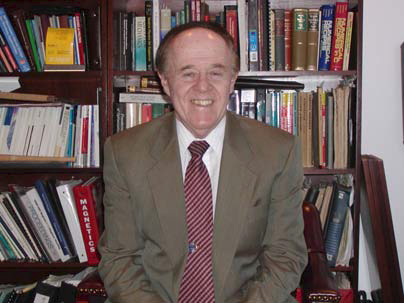Evolution of Passive and Active Microwave Filters
Abstract — “All the World is a Filter†is true today, but was it always so ? The study of passive networks stemmed from the need to understand the performance issues associated with the early power grid at the beginning of the 20th century. Development of radio communication necessitated careful attention to parasitic elements and the limitations of simple representations of inductors, capacitors, etc. The evolution of distributed elements as extensions of lumped descriptions led to significant developments in the area of synthesis, meaning that performance could be tailored to meet needs. Approximation of passive elements by active equivalents is still a work in progress. The danger is ignorance of basic principles and dependence on simulation rather than analytic thinking. This paper will explore history, discuss the present, and try to look into the crystal ball to see what might be just around the corner!
Date and Time
Location
Hosts
Registration
-
 Add Event to Calendar
Add Event to Calendar
- Contact Event Host
- Dr. Ajay Kumar Poddar, Phone: (201)560-3806 (Email:akpoddar@ieee.org
- Co-sponsored by IEEE NNJ MTT/AP, ED/CAS, TMC
Speakers
 Dr. Richard Snyder of RS Microwave
Dr. Richard Snyder of RS Microwave
Evolution of Passive and Active Microwave Filters
This paper will explore history, discuss the present, and try to look into the crystal ball to see what might be just around the corner!
Biography:
Richard V. Snyder is President of RS Microwave (Butler, NJ, USA), author of 94 papers, three book chapters and holds 19 patents. His interests include E-M simulation, network synthesis, dielectric and suspended resonators, high power notch and bandpass filters and active filters. He received his BS, MS and PhD degrees from Loyola-Marymount, USC and Polytechnic Institute of New York (Brooklyn Poly). Dr. Snyder served the IEEE North Jersey Section as Chairman and 14 year Chair of the MTT-AP chapter. He chaired the IEEE North Jersey EDS and CAS chapters for 10 years. He twice received the Region 1 award. In January 1997 he was named a Fellow of the IEEE and is now a Life Fellow. In January 2000, he received the IEEE Millennium Medal. Dr. Snyder served as General Chairman for IMS2003, in Philadelphia. He was elected to ADCOM in 2004. Within the ADCOM, he served as Chair of the TCC and Liaison to the EuMA. He served as an MTT-S Distinguished Lecturer, from 2007-2010, as well as continuing as a member of the Speakers Bureau. He was an Associate Editor for the IEEE Transactions on Microwave Theory and Techniques, responsible for most of the filter papers submitted. He is a member of the American Physical Society, the AAAS and the New York Academy of Science.
He was the MTT-S President for 2011.
Also a reviewer for IEEE-MTT publications and the MWJ, Dr. Snyder teaches and advises at the New Jersey Institute of Technology He is a Visiting Professor at the University of Leeds, in the U.K. He served 7 years as Chair of MTT-8 and continues in MTT-8/TPC work. He is the organizer of the annual IWS conference in China. He previously was Chief Engineer for Premier Microwave.
Email:
Address:President, RS Microwave, Butler, New Jersey, United States
Dr. Richard Snyder of RS Microwave
Evolution of Passive and Active Microwave Filters
Biography:
Email:
Address:New Jersey, United States
Dr. Richard Snyder of RS Microwave
Evolution of Passive and Active Microwave Filters
Biography:
Email:
Address:New Jersey, United States
Dr. Richard Snyder of RS Microwave
Evolution of Passive and Active Microwave Filters
Biography:
Email:
Address:New Jersey, United States
Agenda
6:15-7:15PM: Talk
Free dinner will be served at 5:45 PM. All are welcome. You don't have to be IEEE member to attend the talk.

